 When the United Progressive Alliance government was first formed, a lot was expected from Agriculture Minister Sharad Pawar. His performance has been below par. But party colleague and chela Praful Patel has surpassed the guru.
When the United Progressive Alliance government was first formed, a lot was expected from Agriculture Minister Sharad Pawar. His performance has been below par. But party colleague and chela Praful Patel has surpassed the guru.
A quantification of Patel's contribution to the Indian civil aviation sector may not be available for another 10 to 12 years. But he's quickly grasped what needs to be done in the sector and has actually got down to doing it.
In this, he is different not only from previous civil aviation ministers but also from Pawar -- because Pawar knows what needs to be done but for reasons known to him alone, just isn't moving on the problems.
Patel, it is true, is unhampered by Pawar's problems. He doesn't have to oversee coalitions both in Delhi and Maharashtra and iron-out day-to-day problems.
Again, unlike Pawar's sprawling political-industrial empire, Patel's mass base is limited to his parliamentary constituency, Bhandara in Maharashtra, bequeathed to him by his father and Congress politician Manoharbhai Patel whom he lost early in life. He has diverse industrial interests that he runs only nominally.
This leaves Patel pretty much free to run his other kingdom, the ministry of civil aviation. Make no mistake: he's the boss here. Unlike previous civil aviation ministers who tried but could not dislodge powerful bureaucrats from Rajiv Gandhi Bhavan, Patel bid the bureaucrat-regime good-bye when he took over.
But this has a down side. He has had to constantly look over his shoulder before taking major decisions, because he doesn't have the bureaucracy protecting him. Take fleet acquisition.
The Indian Airlines' decision to acquire aircraft has been cleared but only after Patel created another layer of bureaucracy -- by setting up an Oversight Committee headed by a former Comptroller and Auditor General and getting the prime minister to set up an Empowered Group of Ministers so that acquisition issues didn't have to keep going back to Cabinet. The same structure will be replicated in the case of Air India when the Cabinet clears the acquisition.
Acquisition of aircraft is tricky business. Nothing is easier than charging the minister with corruption because so many variables are involved. Should aircraft be leased or acquired? What should the proportion be? Whom should they be bought from? Because these are large orders and because the market is limited, was enough care taken to leverage the purchase?
In the past several years, both Indian Airlines and Air India have been paralysed because ministers have been either too scared or too hamstrung to take these decisions.
The last time Air India bought aircraft, for instance, was in the 1990s. Even during Patel's ministership, the Indian Airlines board cleared acquisition in 2002, but the Memorandum of Understanding for the purchase is yet to be signed.
If Patel had been a real revolutionary, he would have ensured that not just for acquisition this time, but for the future too, systems/structures of purchase were made more transparent and simpler. Airlines around the world are getting more, not less, competitive.
To meet the demands of a growing market and to present a better product, more, not less bureaucracy is needed. Patel has managed to solve the problem this time, but hasn't really left a legacy for his successors.
He is aware of the failing but is experienced enough to know that he can't change it because Patel has followed the civil aviation ministry for years. He has been on every Consultative Committee attached to the ministry for the past 16 years. This has provided rich experience -- why, he's virtually been shadow civil aviation minister.
This has brought its own baggage. Some years ago, a debate started about the ownership and pattern of holding of a private airline and Patel defended the airline so vigorously that he was dubbed spokesman for that airline. Now when he has been made minister, that charge continues.
Patel says that's not fair. A decision taken by him from, which private airlines have profited has been to let them fly abroad. The ministry devised a formula with two central variables: the number of years in the domestic market and the number of kilometers flown by the airline.
Two players met the criterion -- Jet Airways and Sahara Airlines. You could argue that a newcomer -- such as, say, Paramount or Deccan -- with a few thousand kilometers flying time, and just a few aircraft -- should be allowed to fly abroad from day one.
But you could argue that they should operate on the domestic circuit for a couple of years and only then be given permission to go abroad. Patel has opted for the latter argument.
Because he understands business, Patel's biggest contribution -- which will be fully appreciated some years on -- is to identify source countries for air service bilaterals and liberalise the regime.
Take the new bilateral with the UK that permits 56 flights a week to the UK by the winter of 2006. There is a cap on just two airports in India (Delhi and Mumbai) and one in the UK (Heathrow). Barring this, anyone can fly anywhere.
Air India, which used to have a Delhi-Birmingham flight has now put in place an Amritsar-Birmingham-Toronto flight that caters to an ethnic Punjabi population in the three centres. This is a new revenue stream for Air India.
Negotiations with Singapore along the same lines have failed mainly because the shrewd negotiator that he is, Patel would rather be known as niggardly than give away an onwards flight business India could make use of later.
Airport modernisation was mooted by the NDA government but couldn't get off the ground. Because of the Left parties' reservation, progress of the UPA has been slow. But Patel has promised that by the end of the year, he will have identified foreign partners for Delhi and Mumbai airports and work will have started. India is still waiting.
Here is a clue to illustrate the way Praful Patel works. He has a huge bidi and tobacco-derivatives empire. But among the bouquet of companies he owns is also what promises to be India's first nicotine substitute.
In civil aviation he knows he can change some things and accepts that there are some he can't do anything about. We have a realistic minister. That's half the battle.

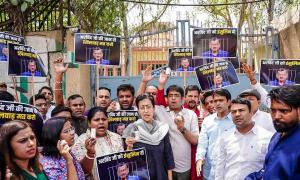
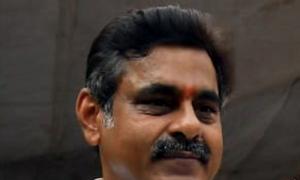
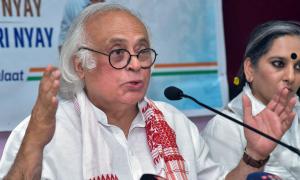

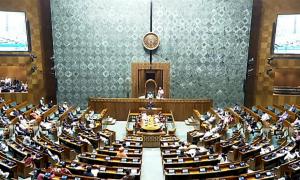
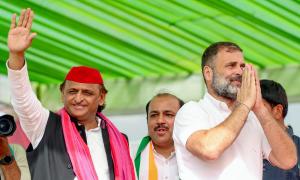
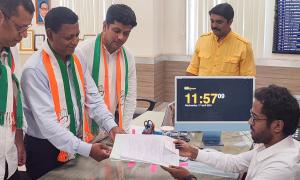
More from rediff